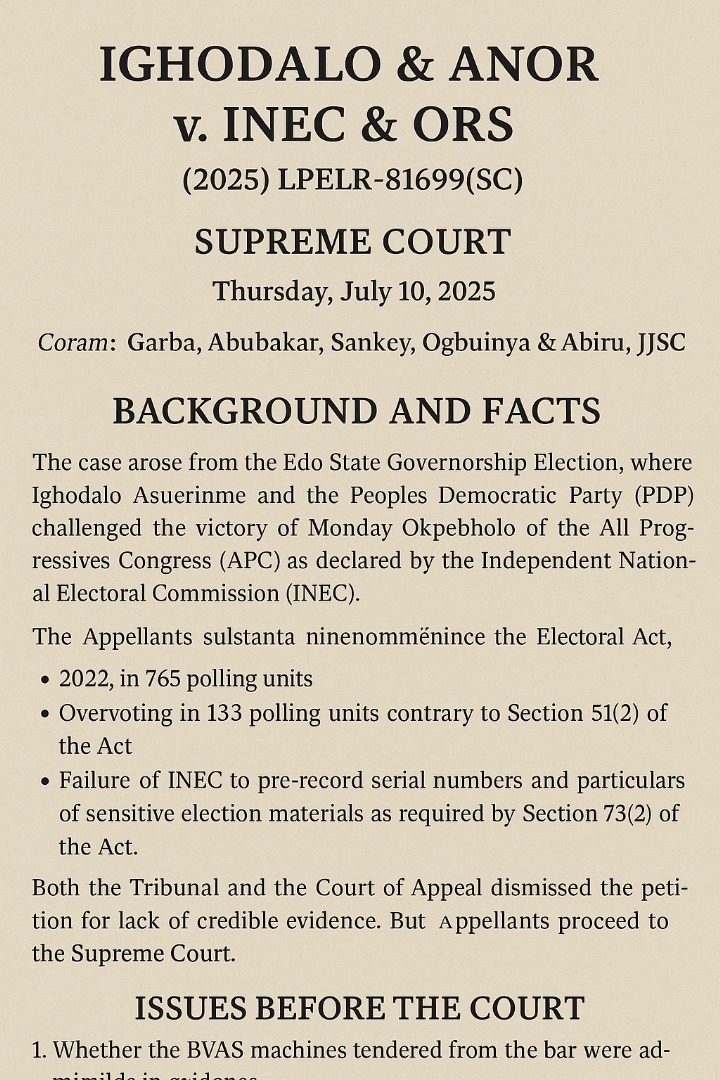TLF LAW REVIEW
TLF LAW REVIEW
Case Note: Ighodalo & Anor v. INEC & Ors (2025) LPELR-81699(SC)
Supreme Court of Nigeria, decided July 10, 2025
Coram: Garba, Abubakar, Sankey, Ogbuinya & Abiru, JJSC

Background and Facts
The case arose from the Edo State Governorship Election, in which Ighodalo Asuerinme and the Peoples Democratic Party (PDP)challenged the victory of Monday Okpebholo of the All Progressives Congress(APC), as declared by the Independent National Electoral Commission (INEC).
The Appellants alleged:
a. Substantialnon-compliance with the Electoral Act, 2022, in 765 polling units;
b. Overvoting in 133 polling units contrary to Section 51(2) of the Act; and
c. Failure of INEC to pre-record serial numbers and particulars of sensitive election materials as required by Section 73(2) of the Act.
Both the Tribunal and the Court of Appeal dismissed the petition for lack of credible evidence. The Appellants proceeded to the Supreme Court.
Issues Before the Court
a. Whether the BVAS machines tendered from the bar were admissible in evidence;
b. Whether the Appellants proved non-compliance under Sections 51(2), 73(2) and 137 of the Electoral Act, 2022;
c. Whether the burden of proof shifted to INEC and the Respondents;
d. Whether the record of appeal was incomplete, thereby affecting the appellate court’s jurisdiction.
Ground breaking Judicial Pronouncements
1. BVAS as Real Evidence – Must Be Tendered Properly
The Court held that BVAS machines are real evidence, not documentary evidence, and thus cannot be tendered from the bar unless by the consent of all parties.
“Where documents are disputed, they cannot be tendered from the bar. They must be produced and tendered through witnesses subject to cross-examination.”
The Supreme Court affirmed that the Tribunal breached the law by admitting the BVAS machines without consent, contrary to Paragraph 41(2) of the First Schedule to the Electoral Act, 2022.
Judicial Impact: This pronouncement sets a clear precedent that technological election materials such as BVAS devices must be demonstrated in open court,establishing a new evidentiary benchmark in election litigation.
2. Proof of Overvoting – The Tripod Rule Reaffirmed
The Court restated that to prove overvoting under Section 51(2), a petitioner must tender and demonstrate three documents:
a. The Voters Register;
b. The BVAS machine showing accreditation; and
c. Form EC8A showing votes cast.
Failure to produce and link these documents to the allegations is fatal.
“These three documents will show exactly what transpired at the polling unit. Failure to tender them is fatal to any effort to prove overvoting.”
Judicial Impact: The decision strengthens the evidentiary “tripod test” and affirms that no allegation of overvoting succeeds without these three documents properly linked to oral evidence.
3.Interpretation of Section 73(2) – Compliance Not Limited to Form EC25B
The Appellants argued that INEC’s failure to complete Form EC25B invalidated the election. The Court rejected this argument,holding that compliance under Section 73(2) may be demonstrated through various prescribed election forms, not only EC25B.
“To insist that all the information must be recorded on Form EC25B, when there is no space for all such information, is absurd and contrary to reason.”
Judicial Impact: The Court’s holistic interpretation harmonizes Section 73(2) with INEC’s guidelines, ending the long-standing debate over which forms evidence compliance.
4.Record of Appeal – Presumption of Completeness
On the procedural issue, the Court held that an appellate court cannot determine an appeal on an incomplete record, but any party alleging incompleteness must file an affidavit demonstrating material omissions.
“The record of appeal is presumed complete and valid until satisfactorily proven otherwise.”
Judicial Impact: This ensures procedural discipline in the handling of election appeals, preventing frivolous objections on technical grounds.
Commentary
The Supreme Court’s decision in Ighodalo v. INEC (2025) represents a major doctrinal advance in Nigerian electoral jurisprudence. It brings clarity to the use of BVAS technology in election disputes, reaffirms the primacy of credible oral testimony, and strengthens the integrity of the judicial process in election adjudication.
Citation
Ighodalo& Anor v. INEC & Ors (2025) LPELR-81699(SC), delivered July 10, 2025.
.png)

